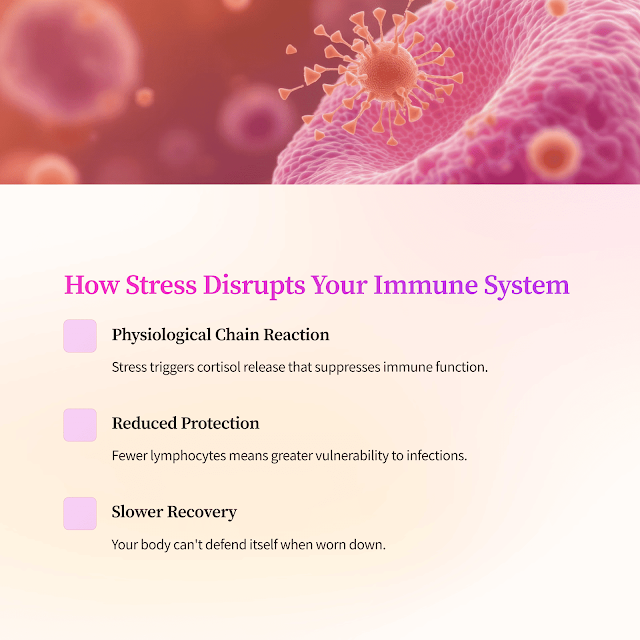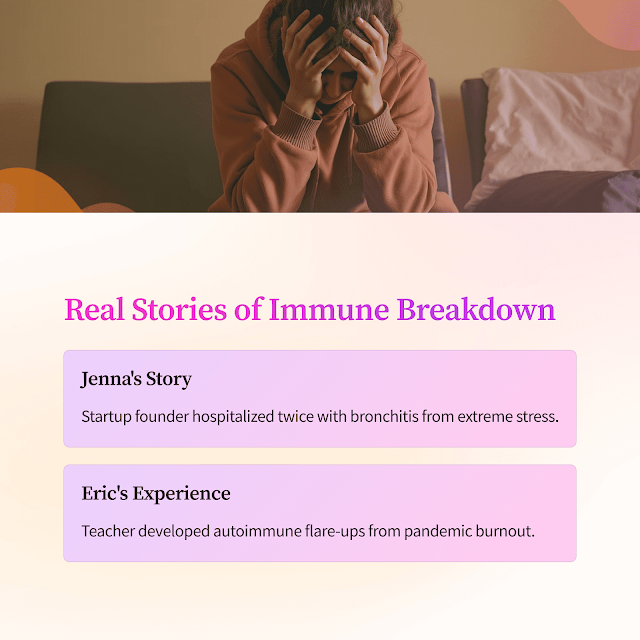Why do doctors warn that stress can be more dangerous than a virus?
Up to 90% of all illness is stress-related, according to the American Institute of Stress. Surprised?
You—yes, you—might be sabotaging your immune system without even realizing it.
Let me tell you a quick story: I once spent three months sick from a cold I couldn’t shake. I thought it was the flu, but it was just my body giving up from burnout.
This invisible enemy affects your energy, your mood, and yes, even how well you fight off disease.
How Stress Disrupts the Immune System
Stress is not just a mental state—it's a physiological chain reaction. The moment your brain perceives a threat, your hypothalamus sends a signal to your adrenal glands to release stress hormones like cortisol and adrenaline. These hormones prepare your body for “fight or flight,” increasing heart rate, blood pressure, and energy supplies.
But here's the problem: when this response is chronic, the elevated cortisol levels begin to suppress the immune system. The production of lymphocytes—white blood cells essential for fighting infections—decreases. Inflammation regulation goes haywire. Your body becomes more susceptible to viruses, bacteria, and even chronic illnesses.
Chronic stress suppresses the immune response by reducing the production of lymphocytes.
This makes the body more vulnerable to infections and slows recovery from illness.
So if you've ever found yourself catching a cold right after a high-pressure deadline, it's not a coincidence—your body was too worn down to defend itself.
The Science of Psychoneuroimmunology
Psychoneuroimmunology is a relatively new but rapidly growing field of study exploring how your brain, nervous system, and immune system interact. And what it's uncovered is groundbreaking: your thoughts and emotions can directly influence your health.
Research from Carnegie Mellon University found that people experiencing chronic stress are more likely to catch colds. Another study published in PNAS (Proceedings of the National Academy of Sciences) showed that even short-term stress can weaken the immune response to flu vaccines.
Studies have shown that chronic psychological stress alters immune cell gene expression and decreases antibody response.
This means that your mindset isn't just important for mental well-being—it's a key player in your physical health too.
10 Signs Stress Is Weakening Your Immunity
Not sure if stress is taking a toll on your immune system? Watch out for these red flags:
- • You catch colds more often than usual
- • Wounds and injuries take longer to heal
- • You feel constantly fatigued or burned out
- • Frequent headaches or migraines
- • Upset stomach or changes in digestion
- • More allergy flare-ups or skin issues
- • You feel anxious or irritable all the time
- • You sleep poorly even when tired
- • You rely on caffeine or sugar to get through the day
- • Your doctor can't find a "medical" cause for your symptoms
If more than a few of these sound familiar, your immune system may be silently begging for a break.
Lifestyle Habits That Protect Immune Health
Let’s flip the script. Instead of only focusing on what stress does to your immunity, how about what you can do to fight back? That starts with your daily habits. Because here's the truth—your immune system is highly responsive to the way you live.
The key? Consistency, not perfection. You don’t have to run marathons or meditate for hours. What matters most is that you repeat immune-supporting behaviors regularly, especially during periods of stress.
Research published in the journal *Frontiers in Immunology* shows that regular sleep, physical activity, and a fiber-rich diet enhance the body’s defense mechanisms even under psychological stress.
It’s the small rituals—seven hours of sleep, a daily walk, a veggie-packed lunch—that form an invisible shield around your health.
Stress Management Tools with Proven Immune Benefits
Not all stress relief methods are created equal. When you’re trying to support your immune system, some methods are more effective than others. Here's what science says works best:
- • Mindfulness meditation: Lowers cortisol and increases natural killer (NK) cell activity
- • Deep breathing exercises: Activates the parasympathetic nervous system
- • Laughter therapy: Reduces inflammatory cytokines and boosts antibody production
- • Nature exposure: Studies show even 20 minutes in a forest can lower stress hormones
- • Journaling: Helps regulate emotional overload and improve immune gene expression
Pick one that feels manageable and start today. Even 5 minutes a day adds up.
The Gut-Brain-Immune Connection
What if I told you that your gut is talking to your brain, and together, they’re influencing how your immune system behaves? Wild, right? But it’s true. This connection is called the gut-brain-immune axis, and it’s been one of the hottest topics in immunology over the past decade.
When you're stressed, your gut lining becomes more permeable (hello, "leaky gut"), which allows toxins and pathogens to sneak into your bloodstream. This triggers systemic inflammation, which further weakens immune response and fuels anxiety and depression—a vicious cycle.
Scientists at Harvard Medical School confirmed that a disrupted gut microbiome due to chronic stress contributes to systemic inflammation and immune dysregulation.
Want to protect your mind and body? Start with your gut. Think fermented foods, prebiotic fiber, and less ultra-processed junk.
Real Stories of Stress and Immunity Breakdown
Sometimes, stats aren’t enough. We need stories to truly feel the weight of a problem. I want to share a few personal and community-based experiences that highlight the very real consequences of unchecked stress on the immune system.
There’s Jenna, a startup founder, who kept pushing through sleepless nights and high-stakes investor pitches. She was hospitalized twice in six months due to recurring bronchitis. The doctors ran tests, but nothing serious was found—just extreme immune suppression. Her recovery only began when she took a two-month break and started seeing a therapist.
Then there’s Eric, a high school teacher. The pandemic, remote classes, and personal grief led to severe burnout. He started experiencing autoimmune flare-ups and ended up on medical leave. With time, therapy, and small lifestyle shifts—like walking his dog daily and joining a local meditation group—his health improved.
These aren’t isolated incidents. They are wake-up calls.
If your body is whispering—listen. Because if you don’t, it will eventually scream.
You don’t need to be perfect to protect your immune system. You just need to be present. If stress is a silent killer, awareness is your armor. Start with one small change today—five minutes of deep breathing, a short walk in the park, or just saying no to that extra task you don’t need. Your immune system will thank you for it. And you? You’ll feel the difference, deeply and completely.
Related Resources
- Stress and the Immune System - National Library of Medicine
- YouTube: How Stress Affects Your Immune System
- American Psychological Association – Stress and Immune Function









Post a Comment